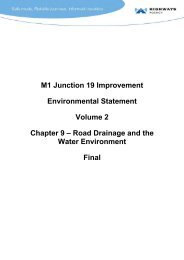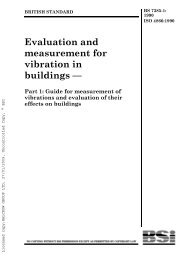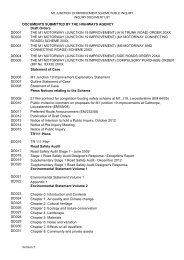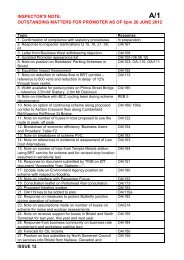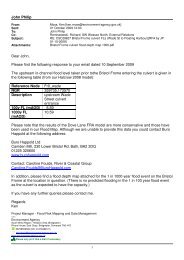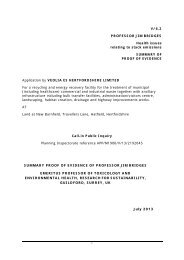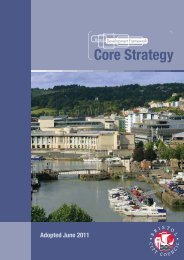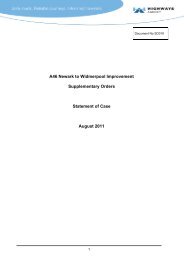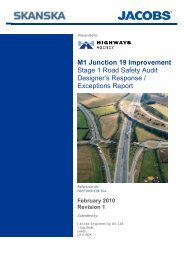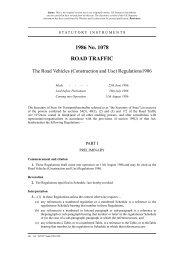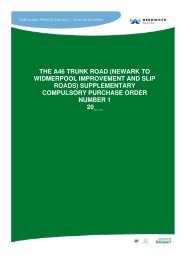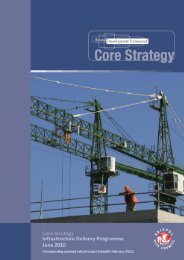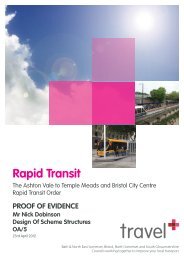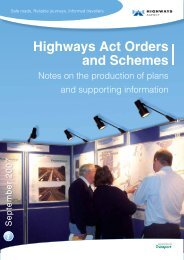Proof of Evidence of Mr James Willcock
Proof of Evidence of Mr James Willcock
Proof of Evidence of Mr James Willcock
You also want an ePaper? Increase the reach of your titles
YUMPU automatically turns print PDFs into web optimized ePapers that Google loves.
Document Reference Number OA/13<br />
<strong>Pro<strong>of</strong></strong> <strong>of</strong> <strong>Evidence</strong> <strong>of</strong> <strong>Mr</strong> <strong>James</strong> <strong>Willcock</strong><br />
4 BUS SERVICES LEGAL FRAMEWORK<br />
4.1 The marketplace for the provision and operation <strong>of</strong> local bus services was<br />
deregulated outside London in 1986, through the Transport Act 1985, later<br />
amended by the Transport Act 2000 and the Local Transport Act 2008. Bus<br />
operators are free to determine the services they wish to operate, including the<br />
route, the service frequency, the fares and other operational matters, on a<br />
commercial basis, subject to certain minimum requirements. Local transport<br />
authorities have powers to procure bus services where there is no commercial<br />
provision and to enhance the level <strong>of</strong> service provided commercially, subject to<br />
legislative provisions.<br />
4.2 The minimum requirement for a commercial bus operator to run a bus service is to<br />
register the particulars (route, timetable etc.) with the Traffic Commissioner at<br />
least 56 days before the start <strong>of</strong> operation. There is no automatic obligation for a<br />
bus operator to adhere to a network or service standard prescribed by the local<br />
transport authority, unless specified by a contract or where an authority has been<br />
successful in invoking legislative provisions controlling the use <strong>of</strong> specific transport<br />
infrastructure, through a Quality Partnership Scheme (QPS). The four councils <strong>of</strong><br />
the West <strong>of</strong> England implemented Quality Partnership Schemes in 2011 and 2012<br />
on 10 showcase bus corridors, which comprise the Greater Bristol Bus Network<br />
major scheme. Each Quality Partnership Scheme entails requirements upon bus<br />
operators known as the Standard <strong>of</strong> Services (e.g. service frequency etc.), in return<br />
for which the councils are required to provide the Facilities (e.g. bus priority<br />
measures etc.). The Quality Partnership Scheme for corridor 8, which includes bus<br />
service X1, 352 and 353 is included as Appendix 2 in OA/13/2.<br />
4.3 Clearly, bus operators are commercially focused and their decision making in<br />
respect <strong>of</strong> the allocation <strong>of</strong> resources (vehicle, drivers and supporting systems) is<br />
based around the need to ensure that there are sufficient farebox revenue streams<br />
to cover all their costs and provide an operating pr<strong>of</strong>it. Moreover, the councils<br />
need to have confidence that the BRT services and feeder bus services will be<br />
provided upon the opening for the BRT schemes, in line with the councils’<br />
objectives and operational principles and will continue on an on-going basis.<br />
4.4 The proposed BRT network is based around a number <strong>of</strong> existing bus services, some<br />
<strong>of</strong> which are provided by bus operators on a commercial basis and some <strong>of</strong> which<br />
are provided under contract to the councils. Also, parts <strong>of</strong> the proposed BRT<br />
network are entirely new services. Given the mix <strong>of</strong> existing commercial and<br />
contracted bus services, the councils have worked in partnership with the bus<br />
Page 9



